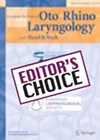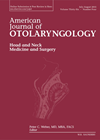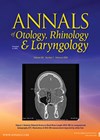
Journal Reviews
In the United States, do people with dysphagia have a higher chance of being dysphonic?
Dysphagia and dysphonia can co-occur due to their shared anatomy and physiology. Previous studies have considered this relationship and determined that certain conditions, such as cancer, laryngeal impairments or neurological disorders, may lead to problems with both swallowing and voice....
Canal cholesteatoma
This is a retrospective study of patients with external auditory canal cholesteatoma (EACC) managed at a single tertiary centre from 1 January 2010 to 1 January 2021. Ninety patients (100 ears) were included. Mean age at diagnosis was 56+23 years....
Budesonide nasal irrigation for chronic rhinosinusitis: is it effective and safe?
Budesonide respules used in nasal irrigations as part of chronic rhinosinusitis management are usually at a dose of 0.25 mg to 2 mg, which is substantially higher compared to budesonide nasal spray, typically ranging from 64 to 256 micrograms. Hence,...
Swallowing their words: translating and adapting swallowing questionnaires to other languages
Dysphagia (swallowing difficulties) is increasingly relevant given the ageing population. Yet measuring or assessing dysphagia is challenging and often costly when exploring instrumental examination. The aim of this study was to translate and validate a patient-reported swallow questionnaire; the Sydney...
Management of post-tonsillectomy bleeding with nebulised TXA
In the last 20 years, rates of adult tonsillectomy have fallen in the order of 50%. The flipside to this, is that the number of admissions of patients with acute tonsilitis is more than double the reduction in tonsillectomy rates....
Bell’s palsy – antivirals and steroids for all?
The role of antiviral medications in the treatment of Bell’s palsy remains somewhat controversial. Antivirals alone do not appear to be helpful, whereas numerous studies have shown that corticosteroids improve the chance of a full recovery compared to placebo. What...
Posterior nasal neurectomy – long-term data shows tailing off of benefits but still improvement after three years
It is well understood that allergic rhinitis has a very detrimental effect on quality of life for afflicted patients. This study looks at patients with allergic rhinitis but no other associated sinonasal or respiratory diagnoses. Patients with a history of...
Congenitally anosmic patients do have fewer olfactory foramina
It has been previously established that patients with Kallman’s syndrome (very much associated with anosmia) have a similar number of cribriform plate foramina when compared to controls. As non-invasive CT assessment of the cribriform plate is now possible in cadavers,...
Hear me out – tiny steroid implants for fighting meningitis-induced deafness
Sensorineural hearing loss is the most common neurological complication of pneumococcal meningitis. Bacterial infiltration into the inner ear triggers inflammation, leading to cochlear fibrosis and sclerosis – damage that, in over a third of cases, affects both ears. Current Infectious...
Management of patulous eustachian tube dysfunction
Idiopathic sudden sensorineural hearing loss (iSSNHL) is defined as a hearing loss of 30 dB or more at three contiguous frequencies within 72 hours, with acute low-tone hearing loss (ALHL) excluded from this category. Despite standard treatment, outcomes vary: one-third...
Endolymphatic pressure disturbances precede endolymphatic hydrops on MRI in definitive Ménière’s disease
The diagnosis of Ménière’s disease is clinical, and the authors tried to verify if endolymphatic hydrops (EH) could be demonstrated on MRI. In this prospective study, they analysed 3D3T FLAIR MRI images of 32 ears with definitive Ménière’s disease (DMD)...
Loudness tolerance levels and misophonia
Misophonia is a prevalent condition, yet its assessment and management remain underrecognised by many audiologists. Current literature highlights the frequent co-occurrence of misophonia with tinnitus and hyperacusis. Hence, the link between loudness intolerance problems and misophonia has been hypothesised by...
















